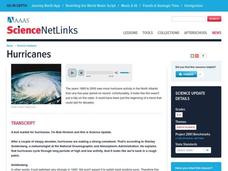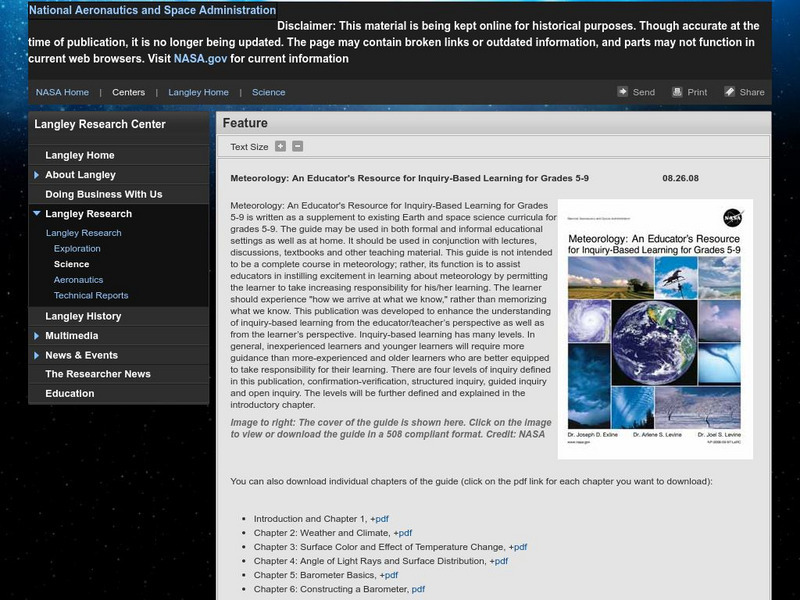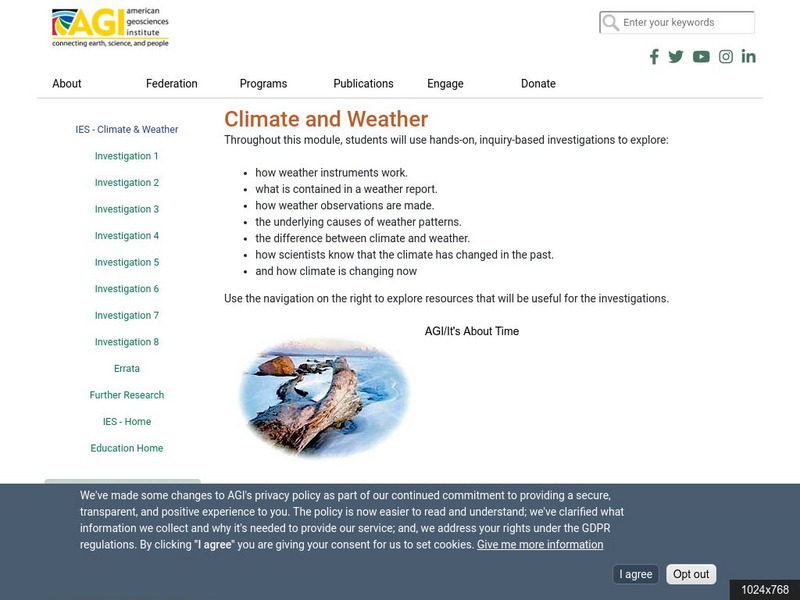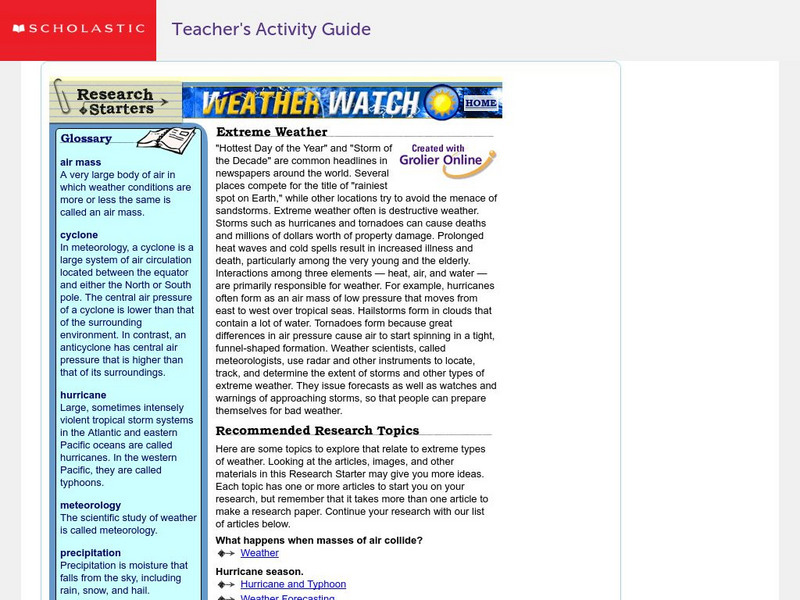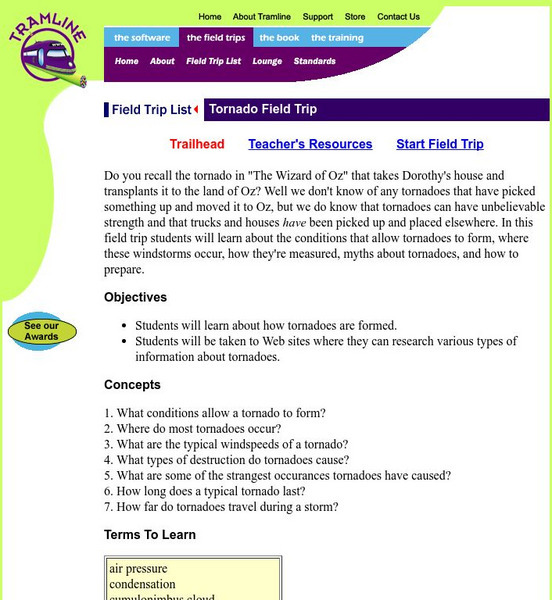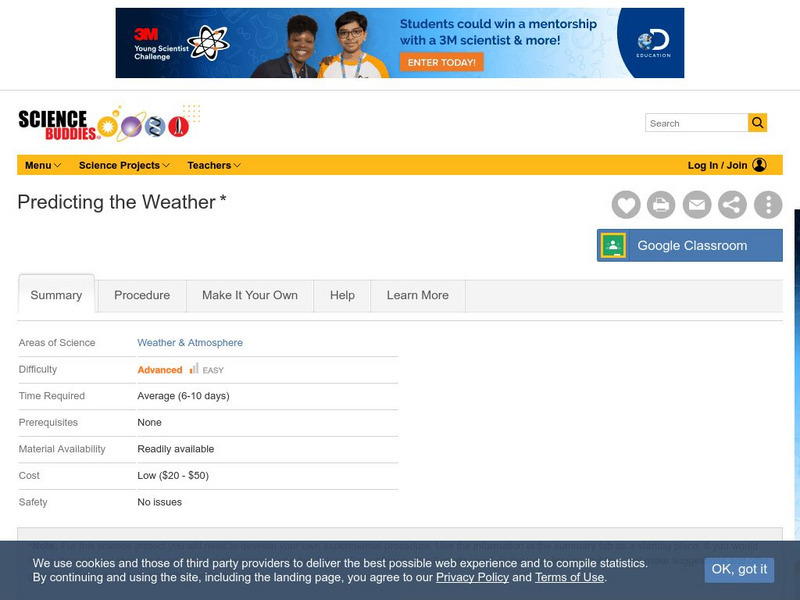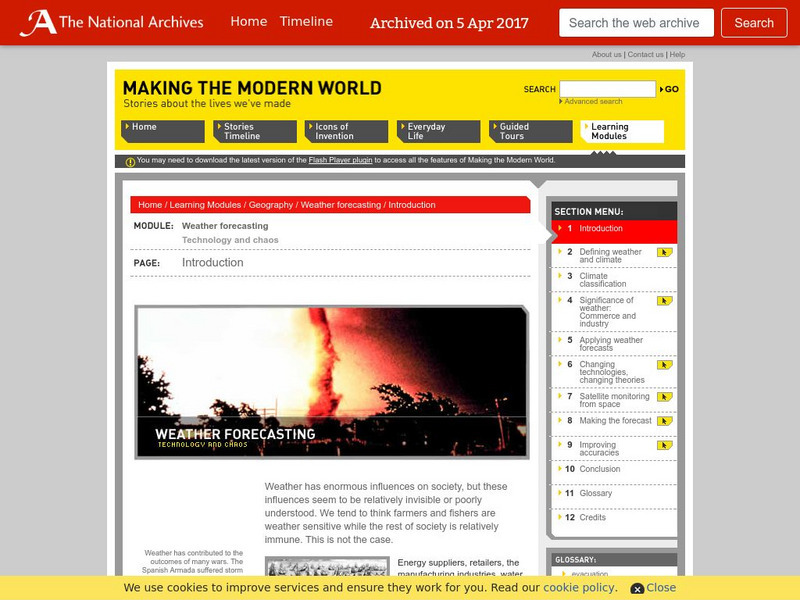Curated OER
What Causes Irregular Temperature Patterns?
Students examine common trends in climate across the U.S. They identify the anomalies in hot-cold temperature differences in the U.S and locate them on the map using latitude and longitude coordinates.
Curated OER
Hurricanes
Students listen to a transcript of an interview about an upswing in hurricanes with Stanley Goldenberg, a researcher with the National Oceanographic and Atmospheric Administration. students participate in a series of discussion questions.
Curated OER
Dateline: El Niño
Students explore El Nino and take the role of a reporter gathering the facts for a news story. Reports are presented orally, like a newscast, written or in whatever form the teacher prefers.
NOAA
Noaa: Cpc: Regional Climate Maps
Provides large colorful maps of climate data about each continent for the current week, month, or previous quarter.
John F. Kennedy Center
The Kennedy Center: Exploring Weather Conditions in Paintings
Enrich your science instructional activity with watercolors! This lesson plan contains assessment criteria, links to more information, and step-by-step ideas to cultivate your learners' knowledge about weather conditions.
NASA
Nasa: Meteorology
Educator's resource guide to be used as a supplement to existing curriculum and to enhance the understanding of inquiry-based learning from both the educator/teacher's perspective as well as from the learner's perspective. Individual...
American Geosciences Institute
American Geosciences Institute: Climate and Weather
Eight hands-on lessons module in which students explore climate and weather. Inquiry-based investigations include observing weather, weather reporting, weather maps, weather satellites, causes of weather, and climate change.
Scholastic
Scholastic: Extreme Weather
Begin your research on extreme weather conditions. View links to other weather related websites and articles.
Stanford University
The Daily Martian Weather Report
Brought to you by the Mars Global Surveyor Radio Science Team. Photos, charts and weather reports on the Martian atmosphere. Includes an education outreach program for students and teachers.
Tramline
Tramline: Tornado Field Trip
In this virtual field trip students learn about the formation of tornadoes. Students also visit websites where they can research various types of information about tornadoes.
University Corporation for Atmospheric Research
Ucar: Living in the Greenhouse
Check out the whole story of climate from ancient times through greenhouse gasses with this interactive resource.
University of Illinois
University of Illinois Urbana Champaign: Forces and Winds
What causes wind? How does wind affect our weather? This website is neatly organized into topics about pressure, gradient force, Coriolis force, geostrophic wind, gradient wind, friction, boundary layer wind, and sea and land breezes....
Science Buddies
Science Buddies: Predicting the Weather
Here's a good way to get yourself on TV. This science fair project will help you learn how to predict the weather. So who knows, maybe you'll be more accurate than your local meteorologist.
Science Buddies
Science Buddies: How Does a Wind Meter Work?
On a windy day it is hard to keep your hat on. The power of the wind can even be strong enough to power large wind turbines to make electricity. In this experiment, find out how you can make your own instrument to measure the speed and...
Science Buddies
Science Buddies: Tracking Geomagnetic Storms in the Ionosphere
The Sun is the ultimate source of the energy that powers weather systems on Earth. Geomagnetic storms are sun-powered storms in the upper atmosphere, arising from energized particles that are periodically ejected by the Sun. Among other...
Science Buddies
Science Buddies: Make Your Own Psychrometer
From the name, you might guess that a psychrometer is an instrument designed to measure your thoughts. Actually, it is an instrument that can help you forecast the weather. Read more to find out how it works.
Science Education Resource Center at Carleton College
Serc: Phenology and the Weatherguide Calendar: An Introduction
A lesson plan to introduce learners to phenology and the Weatherguide calendar. Actvities include stories, journaling, and worksheet completion.
Science Education Resource Center at Carleton College
Serc: Climate Time Line Information Tool
A tool that summarizes climate history for time spans from 1 year to 100,000 years ago and beyond. It explores the relation between human development, weather, and climate. Students learn how past climate is measured, provides basic...
TryEngineering
Try Engineering: Measuring the Wind
Young scholars explore the design of anemometers and how they are used in measuring the speed of wind. Working in teams of "engineers", they will design, build, and evaluate the effectiveness of their own anemometers, presenting their...
Smithsonian Institution
Smithsonian Education: Tomorrow's Forecast: Oceans and Weather [Pdf]
A lesson unit for Grades 4-9 on how the ocean affects climate and weather. Includes worksheets (also in Spanish) and maps.
American Association for the Advancement of Science
Aaas: Project 2061: Topic: Weather and Climate I: Basic Elements
[Free Registration/Login Required] Create a science test that checks for student understanding in science, for common misconceptions, as well as for correct ideas. This is a list of key ideas related to Weather and Climate I: Basic...
American Association for the Advancement of Science
Aaas: Project 2061: Topic: Weather and Climate Ii: Seasonal Differences
[Free Registration/Login Required] Create a science test that checks for student understanding in science, for common misconceptions, as well as for correct ideas. This is a list of key ideas related to Weather and Climate II: Seasonal...
PBS
Teaching Bhutan: The Water Cycle & Bhutan
Interactive science lesson plan that teaches young scholars about the water cycle in relation to mountain ranges and monsoons common in Bhutan. Make a cloud in a bottle!
Science Museum, London
Making the Modern World: Weather Forecasting
The learning module helps students gain a deeper understanding of weather forecasting. Some topics explored are climate classification, making the forecast, and significance of weather. Activities are included.



